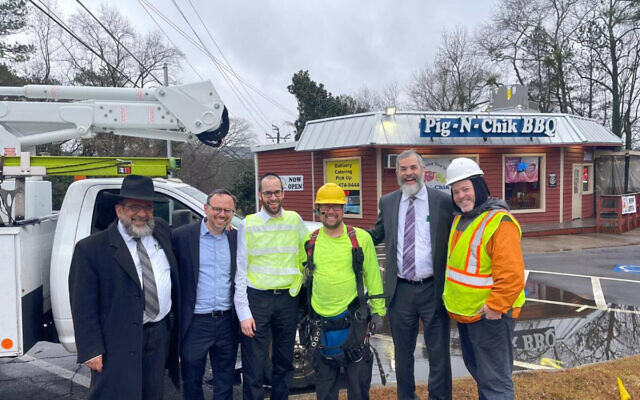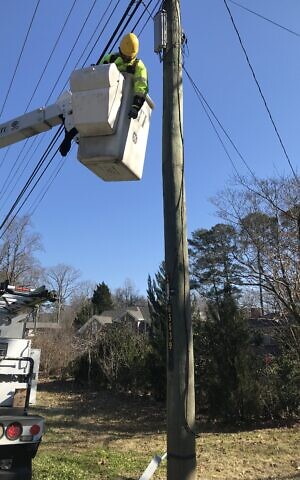Toco Hills Synagogues Unite to Repair Eruv
What happens when the physical border that enables carrying on Shabbat is no longer kosher?
Chana Shapiro is an educator, writer, editor and illustrator whose work has appeared in journals, newspapers and magazines. She is a regular contributor to the AJT.

For those who observe the laws of Shabbat, a community eruv (pronounced ay-roov) is of great importance. The concept was first established almost 2,000 years ago to assist Jews in following the laws of Shabbat.
Two months ago, the continuity and integrity of the seven-mile-long community eruv in Toco Hills appeared to be in danger of no longer being kosher, with repairs estimated at $100,000. Today, thanks to a large fundraising campaign, repairs have been made and the eruv is intact, with funds in place for future maintenance.
According to tradition, nothing can be carried from the domestic zone (such as one’s house) into the public zone on the day of rest. That means not carrying a book to synagogue or a casserole to your neighbor down the street. You can carry a cup of coffee around your house, but you can’t bring it over next door. The eruv is a technical boundary that extends a domestic zone into the public zone.
It joins multiple areas to make one large area, thereby permitting activities within its borders that would otherwise be prohibited. A continuous, elevated wire attached to telephone and light poles in a specifically mandated manner constitutes an eruv.

Thirty years ago, Congregation Beth Jacob constructed Atlanta’s first community eruv. It involved mastering the laws of eruv construction, working with city officials to gain use of their telephone poles, making arrangements with home- and business-owners through whose property the eruv would run and many other personal and financial arrangements.
Today, the Orthodox synagogues in the Toco Hills area contribute to the eruv’s maintenance. Community members support its repairs and trained volunteers check the seven miles of eruv every week. Thousands of Jews depend on the eruv, which allows them to push babies in strollers, bring dessert to friends and carry a raincoat in case of a downpour. A kosher eruv makes synagogue attendance and socialization easy. But, if the eruv is found to not be kosher, members of the Orthodox synagogues are notified before Shabbat begins and everyone has to make adjustments accordingly.
That’s what happened more than a month ago, when the Orthodox congregations, under the oversight of Beth Jacob Assistant Rabbi Dov Foxbrunner, immediately arranged to repair the eruv, which turned out to be no small feat.
In a message to his congregation sent on Jan. 7, Beth Jacob Rabbi Ilan Feldman explained the situation:
“Our community eruv went up on Feb. 7, 1992. For 30 years it has functioned well. A successful community eruv is the result of several factors working right all at the same time: halachic [Jewish law] precision, permission and cooperation of local government and phone and power companies, goodwill of non-Jewish neighbors, technical skill, ingenuity and availability of manpower. When any of these critical factors cease to function at a minimally acceptable level, an eruv can’t work.
“In December we took it upon ourselves to invite Rabbi Mordechai Paretzky to help us address a complex question provoked by a homeowner who suddenly objected, after many years, to having the eruv go through the back of his property, we had to resort to different halachic solutions. Rabbi Paretzky has dealt with almost every possible community eruv question. While Rabbi Paretzky was here we took advantage of his presence to show him other areas and aspects of our community eruv, wanting to have it seen by fresh eyes.
“A good portion of our eruv depends on approximately 240 power poles, and capitalizes on the wires that connect them to each other in a very specific manner. As we began examining many of these poles, we encountered questions due to changed terrain, poles moved by the power company without informing us, partially degraded configurations and difficulty in accessing the configuration from the ground. We assigned sections to be checked by various trained individuals and discovered that the level of confidence that one needs to declare the eruv valid no longer existed.
“The eruv is intended to enhance our ability to observe and enjoy Shabbos. While not having an eruv is not to be taken lightly and causes significant inconvenience and possible absent-minded violation of Shabbos, the eruv being down is an opportunity to focus ever more on the sanctity of Shabbos and the privilege we have to observe it. May Hashem enable us to observe His Shabbos in peace, harmony, and sanctity.”
Since then, Rabbi Paretzky has returned to Atlanta to make the eruv repairs. A multi-synagogue fundraising campaign was launched, surpassing the original $100,000 estimated cost of reconfiguration and repairs. Fundraising will continue in order to further improve the eruv and proceed with a possible expansion.
On Feb. 4, Rabbi Feldman, Rabbi Dov Foxbrunner, Rabbi Adam Starr of Congregation Ohr Hatorah and Rabbi Shmuel Khoshkerman of Congregation Ner HaMizrach met at the corner of Clifton and Briarcliff Roads, in front of Pig-N-Chik BBQ — a crucial eruv stop — causing rubberneckers galore and plenty of fodder for jokesters. By afternoon, the eruv was declared “kosher” and a collective sigh spread as people quickly — and joyfully — reframed their Shabbat plans.
“An eruv is about coming together, and representatives for different shuls are here because we’re one united community,” said Rabbi Adam Starr. “We’ve come together because we’re one united community, in service to HaShem, who take Shabbos observance very seriously.”
“How many times in our community’s history have we had a chance to ‘rise up’ and collectively proclaim our allegiance to Shabbos?” wrote Rabbi Feldman after Shabbat had ended. “Even before the money was committed, a community-wide declaration regarding the sanctity of Shabbos was made when so much Shabbos-related activity stopped … even at the expense of convenience, and when so many were eager to participate in any way they could to help restore the eruv.”



comments